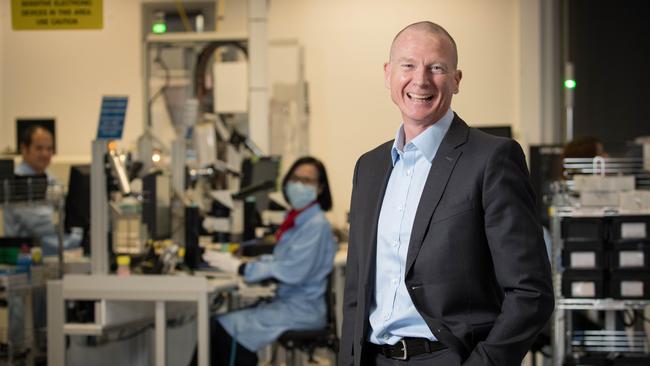Cochlear boss outlines reform roadmap for recovery
Cochlear ceo Dig Howitt says skills and productivity gains are the only way Australians are ever going to repay $618bn in government debt

Cochlear chief executive Dig Howitt says skills and productivity gains are the only way Australians are ever going to repay $618bn in government debt and he has identified three areas ripe for reform.
Mr Howitt called for an overhaul of the tax system, industrial relations regime and the education sector to increase productivity and create more jobs as the country moves from lockdown.
His comments come as total government debt has soared by more than 10 per cent, or $50bn, as the federal government unleashes the biggest handout package in Australia’s history to combat the COVID-19 pandemic. The stimulus includes paying 5.5 million workers $1500 a fortnight until the end of September as part of the government’s $130bn JobKeeper scheme, which is aimed at limiting unemployment to 10 per cent.
While the government’s fiscal response has attracted criticism, Mr Howitt said he supported the package, saying it was better to respond quickly than perfectly months later, potentially placing the country into a deeper economic crisis.
But he said the pandemic offered an opportunity to reset key policy settings to ensure Australia was well placed to repay debt and recover strongly from the coronavirus-fuelled shutdown.
“For any economy to pay off the debt there has got to be productivity gains and really thinking about what is Australia really good at and how can we be a competitive economy that can support job creation and high paying jobs,” Mr Howitt told The Australian.
“That involves a review of the tax system, regulation and ensuring that we have a strong education system at all levels, and we want to ensure Australia is a country where we can create and commercialise intellectual property and retain it in Australia, and all the jobs that go along with that.”
Mr Howitt said Cochlear — which has enrolled in JobKeeper after its revenue fell 60 per cent in April — was an example of how a company can commercialise university research and keep it in Australia.
“It came out of university research with Professor Graeme Clark, has stayed in Australia and has continued to invest in technology and consequently created a lot of jobs and brought a lot of money back in the economy.
“But to create more companies like us — and there are others out there — we do need the right settings around tax and competitiveness to ensure that IP created here stays here and is commercialised here.”
The COVID-19 pandemic has given fresh impetus to the Morrison government to act on calls from Cochlear and others, including the ASX’s biggest company CSL, to deliver consistent research and development incentives after four years of policy review and uncertainty.
In February, Mr Howitt said Cochlear was being wooed by foreign countries, who are seeking to entice the hearing implant maker to carry out slices of its research and development program overseas.
The company spends 12 per cent of its annual turnover each year on R&D and almost 70 per cent of its production innovation is completed in Australia.
“We do want technology companies to succeed in Australia, along with a whole heap of other companies. We want a diverse economy and we have the capability to do it.
“This is a great opportunity to get the underlying policy settings in place to ensure that as a nation that we are productive and create jobs and do pay down debt otherwise it will be passed onto future generations to deal with.”
Mr Howitt also cited energy policy and industrial relations as other areas in need of reform to boost the country’s productivity and employment rate.
“We have a very complicated industrial relations regime that needs to be reviewed to see if we have got the balance right between protecting people with jobs but also creating jobs.
“And as I said the third area is education. We do have a very strong university system.
“But that system is very reliant on overseas students to fund a lot of the research so how that recovers from here will be important to maintaining the level of research that is done in Australian universities because that is one of the key sources of innovation that will create the technology and ideas for the future.’’
Mr Howitt praised the government’s fiscal response to the COVID-19 pandemic so far, despite the stimulus attracting criticism from the opposition who want to extend JobKeeper and some Liberal MPs calling for it to be wound up as early as June three months ahead of its expiry in September.
“I’d commend the government for putting the scheme in place quickly. What we are seeing is some people critical of the scheme or some people with ideas for how the scheme is going to be improved.
“That’s going to happen. If you implement something quickly, people are going to have opinions and ideas about it.
“But I’m pleased the government did implement it quickly rather than complete a few months of consultation to get all the input and then put it in place because by then it would have been too late.”



